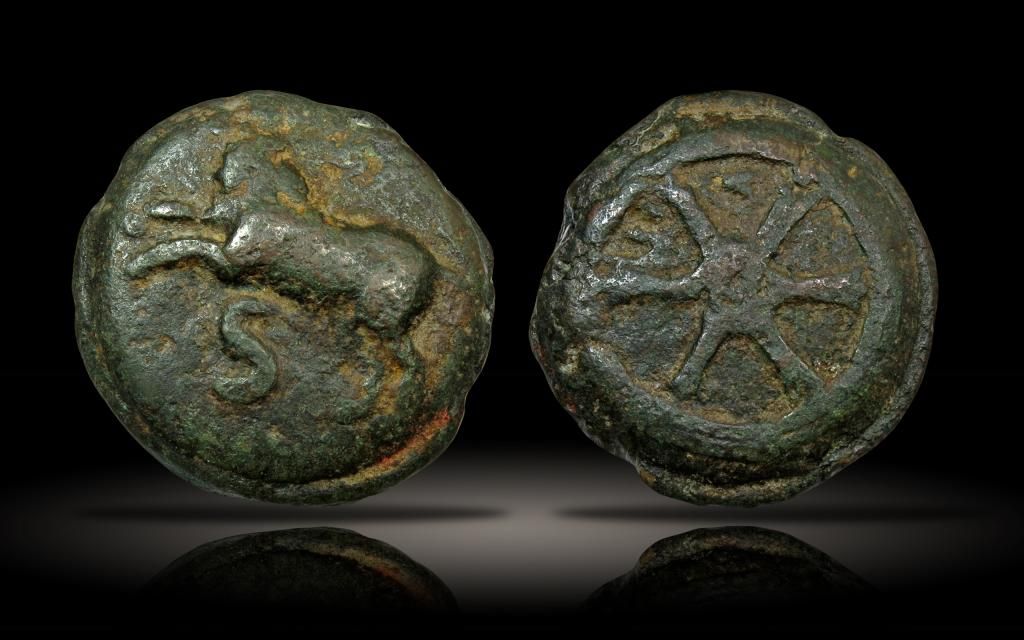Ancients: The Evolution of Roman Coinage (Aes Grave)

Unlike the Greek monetary system which was based around the value of silver and gold, the early coinage of Rome was based on bronze. The progression and maturation of Rome’s currency was chronicled by Pliny the Elder, who described the earliest bronze currency as “aes rude”.
While it allowed for wealth to be portable, it didn't fulfill all of the critical aspects of coinage, as it was only traded by weight, needing to be cast or broken into irregular shapes without being assigned a specific unit of value.
Eventually, these were refined into rectangular bars named “aes signatum”, which featured images and inscriptions, bringing them closer to actual conventional coinage. However, making change still required the bars to be physically broken into pieces. To further improve and optimize trade, the coinage was refined into cast bronze in a disc shape, known as “aes grave”, learning from the concepts introduced by the round coinage of the Greeks.
They came into use during the third century BC and had their value indicated by markings on the coin: “I” for the as, “S” for semis, and various numbers of pellets for smaller denominations known as unciae (with one pellet denoting one-twelfth of an as).
Their weights were closely controlled by the issuing authority, and each denomination was consistent. Depending on where they were issued, an as weighed 272, 327, or 341 grams. This coin is a “semis”, which literally means “half” and is valued at half an as and weighs 135.41 grams, nearly precisely one half of the 272 gram as.
Shortly before the Second Punic War in 218 BC, the method of production of the coinage would be changed to be struck rather than cast. It fell out of use during the Roman Empire, and many of the coins were melted down with their metal reused as other coins.
This coin shows a bull jumping forward on the obverse and a Campanian wheel on the reverse. This type of wheel was formed from bent pieces of wood held in positions of mutual pressure and secured to a hexagonal hub. Several different suggestions as to the meaning of this type have been proposed, speculating that it could be referring to the completion of the Appian Way, the completion of another road construction project, or perhaps a cosmic symbol, as some contemporary coins depict wheels alongside stars and crescents.
Aes Grave. Semis, 265-242 BC bull jumping to the left, head facing forward; below 'S' Rv. Wheel with six spokes; 'S' between two spokes. 135.41 g VT 32 Häberlin pl. 25, 4 Syd. 60 Cr. 24/4. Dark olive green patina. Good Very Fine.
Post your Aes Grave coinage! (Also, as soon as I can, I'll be taking an image of mine with another coin to show its size)
Learn about our world's shared history told through the first millennium of coinage: Colosseo Collection
0
Comments
Nice coin and another great writeup, thanks!
WNC Coins, LLC
1987-C Hendersonville Road
Asheville, NC 28803
wnccoins.com
https://www.civitasgalleries.com
New coins listed monthly!
Josh Moran
CIVITAS Galleries, Ltd.
<< <i>Aes grave is a fascinating and popular series. Ever since the importation ban went into effect on these, prices have really escalated. Two years ago at the ANA, I was able to buy about a dozen pieces from an old collection. I sold all but 1 piece at the show. That sold on our website two months later. I have to admit, I was kind of sorry to see it go. >>
I can certainly understand why the prices are escalating - I too have wanted to acquire one for a while but it was never high up on my wantlist. After hearing of the importation problems, I went out of my way to snatch one up, and I imagine others are doing the same.
The only downside is storage... if I end up trying to acquire more, I may need a separate safety deposit box just for them!
We'll use our hands and hearts and if we must we'll use our heads.